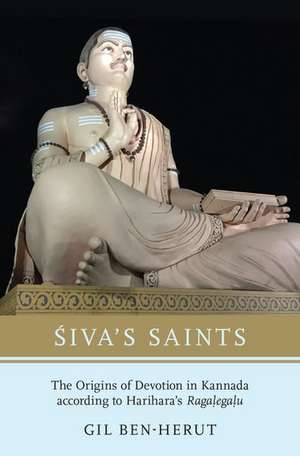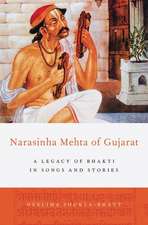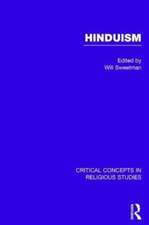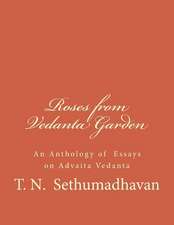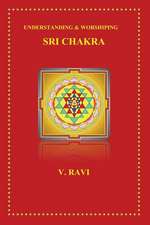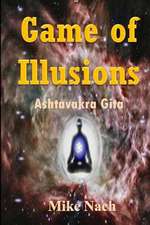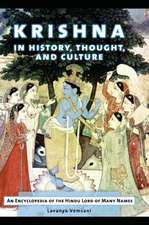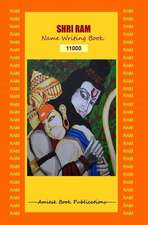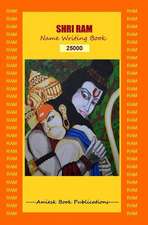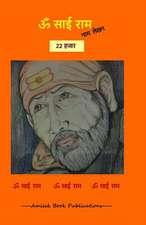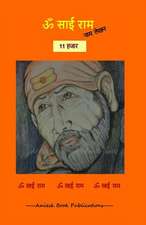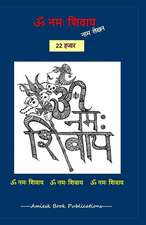Śiva's Saints: The Origins of Devotion in Kannada according to Harihara's Ragaḷegaḷu
Autor Gil Ben-Heruten Limba Engleză Hardback – 16 aug 2018
Preț: 546.22 lei
Preț vechi: 782.50 lei
-30% Nou
Puncte Express: 819
Preț estimativ în valută:
104.52€ • 111.77$ • 87.15£
104.52€ • 111.77$ • 87.15£
Carte tipărită la comandă
Livrare economică 07-14 aprilie
Preluare comenzi: 021 569.72.76
Specificații
ISBN-13: 9780190878849
ISBN-10: 0190878843
Pagini: 296
Dimensiuni: 236 x 160 x 25 mm
Greutate: 0.54 kg
Editura: Oxford University Press
Colecția OUP USA
Locul publicării:New York, United States
ISBN-10: 0190878843
Pagini: 296
Dimensiuni: 236 x 160 x 25 mm
Greutate: 0.54 kg
Editura: Oxford University Press
Colecția OUP USA
Locul publicării:New York, United States
Recenzii
a valuable addition
Śiva's Saints is to be recommended for its lively retelling of several unforgettable stories, such as those of Nimbavve and Ko¯&vu¯&ra Bommatande, its perceptive comments on the politics of premodern South Asian religious literature, and its noteworthy contribution to the growing body of critical scholarship on the still little-understood Vir¯&aśaiva tradition.
Śiva's Saints is a ground-breaking and thought-provoking book that is innovative, well-researched, and well-written. Ben-Herut has established himself as a leader in the study of Indian devotional (bhakti) traditions with this remarkable scholarly contribution. This book will undoubtedly be part of ongoing scholarly discussions concerning Kannada-speaking religion and ought to become a mainstay in graduate courses about bhakti for years to come.
Śiva's Saints undoubtedly will engender a new wave of interest and scholarship on this important and neglected tradition, as well as the broader region
Ben-Huret's inferences and observations not only invite us to rethink not only Kannada Bhakti but the whole of Indian Bhakti. I welcome this well-written, cogently argued book, as an invaluable contribution to Bhakti Studies and all the related areas.
Ben-Herut's work is both accessible to a general readership and integral to the library of any scholar of Hinduism.
Ben-Herut is an essential voice in the critical historiography of devotion or bhakti in India. His study of a lively set of stories about medieval Śaiva Kannada saints conveys the complexity of publics of devotion as people grappled with difficult problems of social ethics, religious difference, and otherness. If anyone is still questioning how to use religious texts to write compelling social and cultural history, read this book and you'll have your answer.
Śiva's Saints is a fascinating study that marks a genuine contribution to scholarly understanding of an important, yet oft-overlooked, religious tradition of southern India. Gil Ben-Herut displays deep knowledge of his primary sources, and he offers a compelling argument for a more nuanced historical view of the early centuries of Kannada-language Śaiva devotion.
This absorbing, truly pioneering book takes us back to the earliest known life-stories of the Vīraśaiva community of southern India'Protestants' before Hus or Luther, famous for their feistiness and devotion to egalitarian community. Ben-Herut shows that here as in Europe the egalitarian characterization cannot really stand up to historical scrutiny. The terrain is more complex and diverse. But the diversity itself is fascinating--and the feistiness is undiminished.
Śiva's Saints is to be recommended for its lively retelling of several unforgettable stories, such as those of Nimbavve and Ko¯&vu¯&ra Bommatande, its perceptive comments on the politics of premodern South Asian religious literature, and its noteworthy contribution to the growing body of critical scholarship on the still little-understood Vir¯&aśaiva tradition.
Śiva's Saints is a ground-breaking and thought-provoking book that is innovative, well-researched, and well-written. Ben-Herut has established himself as a leader in the study of Indian devotional (bhakti) traditions with this remarkable scholarly contribution. This book will undoubtedly be part of ongoing scholarly discussions concerning Kannada-speaking religion and ought to become a mainstay in graduate courses about bhakti for years to come.
Śiva's Saints undoubtedly will engender a new wave of interest and scholarship on this important and neglected tradition, as well as the broader region
Ben-Huret's inferences and observations not only invite us to rethink not only Kannada Bhakti but the whole of Indian Bhakti. I welcome this well-written, cogently argued book, as an invaluable contribution to Bhakti Studies and all the related areas.
Ben-Herut's work is both accessible to a general readership and integral to the library of any scholar of Hinduism.
Ben-Herut is an essential voice in the critical historiography of devotion or bhakti in India. His study of a lively set of stories about medieval Śaiva Kannada saints conveys the complexity of publics of devotion as people grappled with difficult problems of social ethics, religious difference, and otherness. If anyone is still questioning how to use religious texts to write compelling social and cultural history, read this book and you'll have your answer.
Śiva's Saints is a fascinating study that marks a genuine contribution to scholarly understanding of an important, yet oft-overlooked, religious tradition of southern India. Gil Ben-Herut displays deep knowledge of his primary sources, and he offers a compelling argument for a more nuanced historical view of the early centuries of Kannada-language Śaiva devotion.
This absorbing, truly pioneering book takes us back to the earliest known life-stories of the Vīraśaiva community of southern India'Protestants' before Hus or Luther, famous for their feistiness and devotion to egalitarian community. Ben-Herut shows that here as in Europe the egalitarian characterization cannot really stand up to historical scrutiny. The terrain is more complex and diverse. But the diversity itself is fascinating--and the feistiness is undiminished.
Notă biografică
Dr. Gil Ben-Herut is an Assistant Professor in the Religious Studies Department, University of South Florida. His research interests include pre-modern religious literature in the Kannada language, South-Asian bhakti (devotional) traditions, and the vernacularization of Sanskrit poetics and courtly literature.
